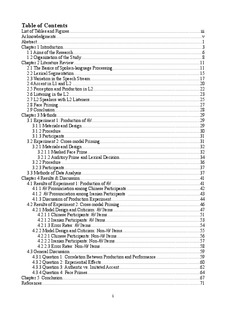Spoken-word recognition of foreign-accented /θ/ by L2 English listeners
Master thesis
Permanent lenke
http://hdl.handle.net/11250/243548Utgivelsesdato
2013Metadata
Vis full innførselSamlinger
Sammendrag
A production task and a cross-modal priming experiment were used to investigate the influences of accented pronunciation and linguistic experience on recognition of non-native spoken words. A masked face prime image was also shown to determine if seeing a face that matched the ethnicity and gender of the speaker of the auditory prime would facilitate accented word recognition. Chinese and Iranian learners of English heard words containing either an /s/ or a /t/ substitution for the interdental fricative /θ/. A mixed-effects model analysis of the response time data showed that participant groups differed markedly depending on the prime condition and the speaker. Chinese participants showed significant facilitation for /s/ primes spoken by the Chinese speaker, inhibition for /s/ primes spoken by the Iranian speaker, and no priming effects for the /t/ substitution. The Iranian participants, on the other hand, appear not to have been affected by the substitutions for /θ/ but rather by the accent itself, showing a marginally significant facilitation for both /s/ and /t/ variants when they were spoken by the Iranian speaker. This study provides empirical evidence that participants with different L1s do not necessarily process accented words produced by speakers with different L1s in the same way: segmental substitution may weigh more heavily for some groups, while others may be affected by phonetic detail of the accent as a whole.
